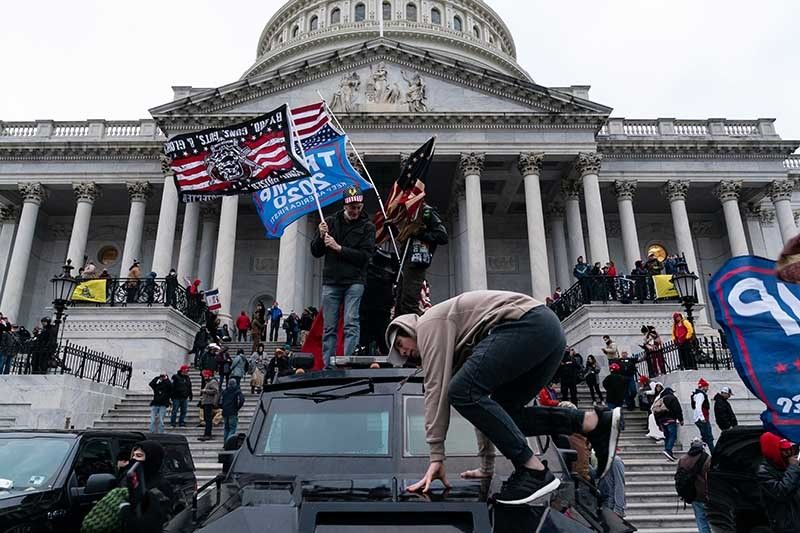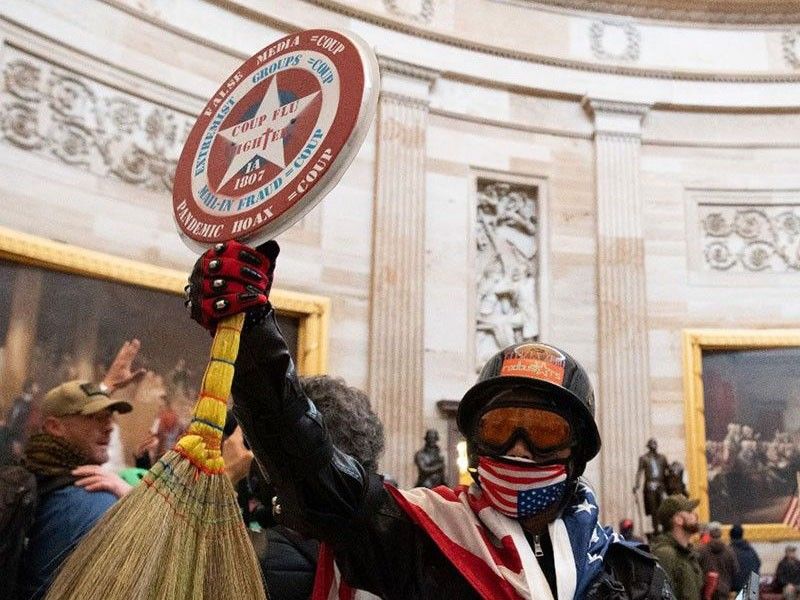'Election denialism' stalks US midterm polls, puts democracies abroad at risk

PHOENIX, Arizona — Election denialism, or the refusal to accept the outcome of the 2020 polls, was a key issue in the run-up to the 2022 midterm elections in the United States and analysts said it could spread and affect democracy around the world.
Scholars and analysts have sounded alarm that this may downplay the electoral process, a key part of a democratic society, as powerful figures cast doubt on a process that meant to determine the will of the people.
"Democracy isn't just people voting for the winner, it's having the outcome of that vote respected by the loser," Greg Winger, professor at the University of Cincinnati’s School of International and Public Affairs, told Philstar.com in an online interview.
A tally as of November 3 by ABC News and Five Thirty Eight showed 199 Republican candidates out the 552 total "fully denied the legitimacy of the 2020 election."
The candidates claim the presidential seat was “stolen” from former US President Donald Trump, who was then running for reelection. They also refused to certify results and joined those who filed lawsuits to overturn the election results.
Meanwhile, 61 candidates raised questions on the 2020 election results, 93 have “accepted [them] with reservations,” and 122 candidates either had no position on the matter or did not answer directly when asked. Only 77 accepted election results fully.
READ: A year after Capitol riot, Americans fear for their democracy — polls
"[The other issue] is the growing ability in America and in other democratic countries for the powerful to isolate them from electoral consequences and to enjoy the spoils of power with relative immunity," William Umphres, who teaches the intersections of law, politics, and society at the University of Cincinnati, told Philstar.com in an e-mail.
"By hollowing out in electoral systems, they further this goal."
Candidates who have been echoing allegations of fraud, which have so far proven baseless, have made it a key message in their campaign trails.
The battleground states with a big number of election-denying candidates include Pennsylvania, Arizona, Michigan, Florida, Texas, Wisconsin and Georgia.
READ: US midterms and the 'election deniers' threatening democracy
US Pinoys for Good Governance National president Rodel Rodis said this makes for a "scary situation."
"[Trump] has made people believe that you cannot trust elections and you just have to accept that he is the president and that’s not true," Rodis told Philstar.com in an interview.

Resentment and conspiracy theories surrounding these doubts led to the January 6, 2021 riot in Washington DC, where Trump supporters stormed the Capitol Building.
Winger said the trend may lead to the falling apart of the “basic bedrocks of society” and popular governance across the globe.
"This has become a question of, not just election integrity... but the legitimacy of the elections and then that becomes translated to the legitimacy of the governments and then if you have questions about how legitimate the government is? How do you have legitimacy of laws? How do you have legitimacy of rules," Winger said.
Closer to home
Similar doubts were raised about the 2016 national elections in the Philippines during Ferdinand “Bongbong” Marcos Jr.’s electoral protest against then Vice President Leni Robredo. The narrative of cheating persisted despite the Presidential Electoral Tribunal ruling that Marcos failed to prove his allegations.
READ: SC junks Marcos' poll protest vs Robredo
Marcos had repeatedly claimed he was cheated in the 2016 vice presidential race, despite not providing concrete evidence of such accusation and even if a recount of votes from precincts in Lanao del Sur, Basilan, and Maguindanao saw Robredo’s lead increase to 278,566 from 263,473.
"The promotion of this narrative shifts focus away from the ‘sins’ of his family and also betrays Marcos’ disrespect for the rule of law, democratic institutions and processes like elections when the results do not favor him and his family," University of the Philippines political scientist Maria Ela Atienza told Philstar.com.
READ: Asked about Martial Law abuse, Marcos questions Amnesty International data
Meanwhile, Umphres argued that "electoral security and fairness becomes an issue in future elections for the group who thinks they were 'cheated' last time."
Throughout the campaign period this year, Marcos’ camp and his supporters would repeatedly refer to what supposedly happened in 2016 to fuel their drive to capture the presidency. Marcos himself promised to supply supporters with coffee so they could stay awake and watch out for an upset, which, supporters implied, would be proof of cheating.
"The narrative that he was cheated in the 2016 vice presidential race was only one of the stories that Marcos’ campaign team successfully fed to voters," Atienza said, adding that it was part of Marcos’ “huge machinery of disinformation.”
RELATED: TikTok defends platform amid concerns over political disinformation
Claims on election fraud persisted until election day itself, with his camp claiming without proof that some voters saw a mismatch in their voting receipts that showed a vote for Robredo as president instead of Marcos.
Media gives denialism oxygen
Pinny Sheoran, president of the League of Women Voters, observed that the mainstream media played a role in amplifying election denialist narratives, saying "you say a lie enough times, you will cause people to believe it’s the truth."
"You give oxygen sometimes to things that you might need to be mindful of because you have an obligation to educate the public about the truth," she told journalists on the International Reporting Tour hosted by the US Department of State’s Foreign Press Center on Thursday.
She said published falsehoods were not "accidents" and were meant to drive media companies with dedicated audiences to feeding their readers’ and viewers’ biases.
"Politicians like Marcos, Trump, [Jair] Bolsonero (of Brazil), Hugo Chavez (of Venezuela), [among others], quickly recognized that they could use these outlets as effective mouthpieces for their misinformation," Winger said.
"They also understood implicitly that rage and fear were powerful political motivators."
Back home, Filipinos’ trust in news rose by five percentage points to 37% according to the 2022 Digital News Report by the Reuters Institute for the Study of Journalism. However, trust ratings in individual news brands and interest in the news are declining.
A recent survey by private pollster Pulse Asia, however, showed that almost nine out of 10 Filipinos think that “fake news” or false narratives is a problem in the country, with 58% of them putting the blame on social media influencers, bloggers, and vloggers.
Despite efforts to curb disinformation through fact-checking and explanatory reporting, journalists still have to tread the hostile waters that false narratives built. — with reports from Agence France Presse, Xave Gregorio, and Kristine Joy Patag
--
This story was made possible through the International Reporting Tour hosted by the US Department of State's Foreign Press Center.
- Latest
- Trending































